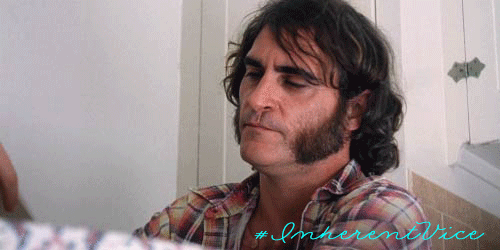“Inherent Vice,” director Paul Thomas Anderson’s (“The Master”) latest production, has had film-lovers salivating with anticipation from the moment Anderson began his involvement in 2010. But even under the supervision of one of the most esteemed directors and writers of the Millennial era, “Inherent Vice” falls victim to its original material.
Upon seeing the film, based on Thomas Pynchon’s critically-acclaimed novel of the same name, it is clear why it took four years to reach theaters. Pynchon’s work is notoriously ambiguous, psychedelic and linguistically perilous, creating a literary cornucopia seemingly impossible to transfer to the screen.
The plot is burrowed beneath a marijuana-induced veil as it follows hippie private eye Larry “Doc” Sportello (Joaquin Phoenix, “Her”) as he navigates early 1970s California and a recent debacle brought to him by an elusive ex-girlfriend named Shasta Fay Hepworth (Katherine Waterson, “Boardwalk Empire”). The convoluted plot surrounding a real estate mogul put into an insane asylum by his wife, and his possible involvement in heroin dealing from Asia, develops slowly in abrupt chunks. An impressive ensemble cast, an Anderson trademark, comes and goes with little introduction, including a Los Angeles detective Christian “Bigfoot” Bjornsen’s (Josh Brolin, “Sin City: A Dame to Kill For”), Deputy D.A. Penny Kimball (Reese Witherspoon, “Wild”), heroin addict saxophonist Coy Harlingen (Owen Wilson, “Night at the Museum: Secret of the Tomb”), as well as many, many more.
Despite occasional airy narration by Doc’s hippie friend Sortilége (Joanna Newsom, “The Strangers”), the film suffers from a lack of a coherent framework to lead the audience through the complex plot, abundance of characters and vague themes. The tension between the “dopers” and the straight-laced mainstream police officers is reiterated by Doc’s and Bjornsen’s strained communication. The film, however, does not clearly depict either as a suffering protagonist or cruel antagonist. Even the neo-Nazis present in the film were not entirely characterized as “evil.” This ambiguity could be compelling if the plot was more clear and the characters further developed, but without these facets this delicate dichotomy fails to inspire the audience.
However, the film is by no means a total failure and Pynchon’s tale is conveyed well in some capacity. The dark, dry humor elicited best from the earnest and harmlessly high Doc and his misadventures alleviate the sluggish, confusing plot. Along a similar vein, the actors’ performances are consistently excellent: Phoenix disappears beneath his messy mane and massive sideburns; Brolin embodies the emotionally-constipated, aggressive detective; and smaller acts like Maya Rudolph’s (“Big Hero 6”) secretary and Jena Malone’s (“Hunger Games: Catching Fire”) recovering heroin-addict mom are great.
Arguably the most entertaining supporting performance was provided by comedian Martin Short (“The Wind Rises”), who plays an eccentric, horny and cocaine-snorting dentist Dr. Rudy Blatnoyd. Much like the other secondary characters he has limited screen time, but succeeds in being a charismatic and ridiculous comic relief the film desperately needs.
Overall, Anderson’s stylish yet no-frills directing does its best to present the bizarre story. He succeeds in making sure the 1970s context is not a groovy caricature while simultaneously providing a creative angle to Doc’s journey. His efforts are enhanced by the soundtrack composed by Radiohead guitarist Jonny Greenwood, his third collaboration with Anderson and one of the best parts of the film.
However, a seasoned director, Radiohead alum and talented ensemble cast were not enough to salvage the production. Within the massive running time of 148 minutes, the plot meandered through a drugged haze, the characters made little to no impact and any higher moral theme was lost. As a result, the audience is left bewildered and apathetic to the fates of Doc and his companions. “Inherent Vice” is a disappointing product after four years of production.
2.9/5


